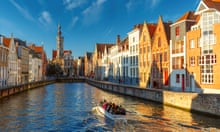The Suez Canal Authority is increasing the fees it charges ships passing through the critical waterway, in a move expected to pile further inflationary pressure on global supply chains.
It will seek to capitalise on the recovery in cargo trade by raising its transit tolls by 6% from February, 11 months after the canal was blocked for nearly a week by the Ever Given container ship. About 12% of international trade passes through the canal, which is the shortest maritime route between Asia and Europe.
The Suez Canal Authority has benefited from the rebound in economies since the first wave of coronavirus lockdowns were lifted. It cited an International Monetary Fund and World Trade Organization forecast that global trade traffic will rise by 6.7% in 2022, which it said would mean “good profits” for shipping companies.
The increase in fees will not apply to liquefied natural gas vessels. Cruise ships will also be excluded because the sector experienced a deeper shock than others from the pandemic.
“The tourism and travel sector has suffered major losses worldwide, including cruise ships and sea yachts, and is expected to complete its recovery by 2022,” the authority said.
Admiral Osama Rabea: “Increasing the transit tolls of all the types of transiting ships through the canal with 6% during 2022 and fixing/ stabilizing the tolls of LNG ships and cruise ships only..for more details 🔗https://t.co/Gw8X2S49B1 pic.twitter.com/3ZuEI55Yqq
— هيئة قناة السويس Suez Canal Authority (@SuezAuthorityEG) November 4, 2021
Last month, the canal recorded the highest monthly tonnage in its history, at 112.1m tons. A total of 1,847 ships travelled through the canal in October, 14% more than a year ago.
The canal authority also reported record revenues in the last financial year, despite the six-day blockage after the 220,000-ton Ever Given ran aground in March. Revenues rose to $5.84bn in the 12 months to 30 June as strong demand for goods drove a recovery in trade.
Shipping companies have benefited from this rebound, too. Maersk, the world’s largest container shipping group, posted its most profitable quarter ever this week. It also predicted the global supply chain crisis would continue well into next year, with shortages of dockworkers and lorry drivers causing disruption.
The global shipping industry is still recovering from the disruption caused by Ever Given, according to George Lawrie, a vice-president and principal analyst at the research firm Forrester.
“Since the pandemic, changes in consumption and shopping patterns, including a surge in e-commerce, have already increased import demand for container shipments of consumer goods to North America and Europe. In addition, new markets for Asian manufactured goods require more ships for a weekly service, which in turn means yet more containers on the high seas,” he said this week.
“Compounding the problem, the global container circulation had still not recovered from the recent Suez canal blockage.”








